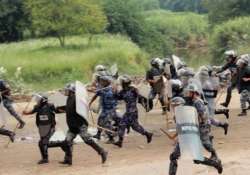Nepalese police opens Indo-Nepal border point after 40 days
Kathmandu: Nepalese police today forcibly removed the agitating protesters from their sit-in spot on crucial Miteri Bridge at Indo-Nepal border, opening the Birgunj-Raxaul border point after 40 days. The protesters initially hurled stones towards police

Kathmandu: Nepalese police today forcibly removed the agitating protesters from their sit-in spot on crucial Miteri Bridge at Indo-Nepal border, opening the Birgunj-Raxaul border point after 40 days. The protesters initially hurled stones towards police when the latter started removing them early this morning.
They were eventually chased away by police. Some 170 freight trucks entered into India from Nepal after the border was opened, The Kathmandu Post reported. However, no trucks have entered into Nepal from the Indian side so far, it added.
Madhesis - who claim to represent the interests of the Indian-origin inhabitants of Nepal's Terai region (plains) - have been protesting close to the main Nepal-India trading point near Raxaul, through which about 70 per cent of bilateral trade is done.
Their agitation has led to a halt in supply of essential goods, causing acute shortage of fuel in Nepal. Raxaul customs superintendent Arun Kumar Rajat said that the trucks stranded on Indian side will be sent to Nepal since the border was cleared since this morning.
“There is no point in stopping the freight trucks and tankers as the border has cleared. The trucks, tankers and LPG bullets will be sent to Nepal,” he was quoted as saying by the Post.
Talks between Nepal government and Madhesi groups agitating over the country's new constitution yesterday ended inconclusively, but Deputy Prime Minister Kamal Thapa said the dialogue was moving in a positive direction.
The major demands of the Madhesi Front are to re-draw the demarcation of the federal provinces and inclusion of more rights and representation to the Indian-origin Madhesi people. Other demands include martyrdom status to those killed during recent protests, free treatment to the injured, compensation to victims' families and withdrawal of security forces from Terai districts among others.
The alliance has been staging protests in various parts of southern Nepal against the seven-province model of the newly-promulgated Constitution for more then two months. The southern plains of landlocked Nepal have been simmering with tension since the Constitution was formally adopted on September 20.
Over 40 people have died in the violent agitation that has also overwhelmed Indo-Nepal ties as transit of goods and fuel to the Himalayan nation from India via the major border trading points has been badly affected.